
Journal of Alternative Investments
Scope & Guideline
Exploring innovative pathways in finance.
Introduction
Aims and Scopes
- Alternative Asset Classes:
The journal covers a wide range of alternative asset classes including private equity, hedge funds, cryptocurrencies, real estate, and commodities, emphasizing innovative investment strategies and their performance metrics. - Sustainability and ESG Integration:
There is a significant focus on environmental, social, and governance (ESG) factors, exploring how sustainable practices impact equity performance and investment returns across various markets. - Risk Management Techniques:
The journal addresses advanced risk management methodologies, including the application of modern portfolio theory and quantitative approaches to enhance asset allocation and investment outcomes. - Market Dynamics and Trends:
Research on market dynamics, trends in alternative investments, and the implications of macroeconomic factors such as inflation and climate change on asset performance is frequently featured. - Innovative Investment Strategies:
The journal promotes innovative methods of investing, such as the use of alternative data, machine learning, and new financial instruments like NFTs and cryptocurrencies.
Trending and Emerging
- ESG and Sustainable Investing:
The integration of ESG factors into investment strategies is increasingly emphasized, reflecting the growing importance of sustainability in the investment community and its impact on performance. - Cryptocurrencies and Digital Assets:
Research on cryptocurrencies, including their role in diversified portfolios and as standalone investments, has become a prominent theme, indicating a shift towards digital finance. - Impact of Climate Change on Investments:
There is a rising interest in the effects of climate risk on various asset classes, particularly real estate and corporate finance, highlighting the need for adaptive investment strategies. - Innovative Financial Instruments:
The exploration of new financial instruments, such as NFTs and securitized assets, is emerging as a key area of focus, reflecting the evolution of investment opportunities in the digital age. - Behavioral Finance in Alternative Investments:
An increasing number of papers are examining behavioral finance aspects related to alternative investments, which offers insights into investor decision-making processes and market anomalies.
Declining or Waning
- Traditional Commodities Analysis:
There is a noticeable decrease in studies focused on traditional commodities and their valuation, suggesting a shift towards more innovative asset classes and investment strategies. - Generalist Hedge Fund Strategies:
Research on broad, non-specific hedge fund strategies seems to be waning, with more emphasis being placed on specific niches and alternative investment vehicles rather than generalized hedge fund performance. - Basic Real Estate Investment Analysis:
The analysis of real estate investments in a conventional sense has diminished, as the journal increasingly focuses on more complex and innovative aspects such as real estate's role in sustainable investing. - Crowdfunding and Peer-to-Peer Lending:
Topics related to crowdfunding and peer-to-peer lending have seen a decline, likely due to the maturing of these markets and a shift towards more established alternative investment strategies. - Historical Performance Metrics:
Research centered on historical performance metrics without considering contemporary factors like ESG or technological impacts is less common, indicating a move towards more relevant and timely analyses.
Similar Journals
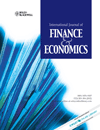
INTERNATIONAL JOURNAL OF FINANCE & ECONOMICS
Fostering Excellence in Financial ScholarshipInternational Journal of Finance & Economics, published by Wiley, is a premier academic journal that serves as a vital resource for researchers and professionals in the fields of finance, accounting, and economics. With an impressive impact factor and a reputation for excellence, the journal is recognized in the 2023 Scopus rankings, placing in the top quartiles across multiple categories, including Q2 in Accounting, Economics, and Finance. The journal has been a significant contributor to academic discourse since its inception in 1996, with its converged years extending to 2024, thereby ensuring the continuous advancement of knowledge in these critical areas. Although it operates under a traditional subscription model, its comprehensive articles provide insightful analyses, empirical research, and theoretical advancements that cater to a diverse audience—from seasoned scholars to emerging students in the field.
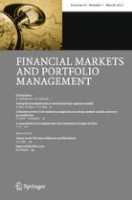
Financial Markets and Portfolio Management
Empowering Insights for Financial Innovators.Financial Markets and Portfolio Management is a renowned peer-reviewed journal published by Springer, focusing on the dynamic and evolving intersections of finance, economics, and accounting. With an ISSN of 1934-4554 and an e-ISSN of 2373-8529, the journal provides a platform for innovative research on financial markets, investment strategies, and portfolio management techniques. It boasts an impactful presence in the academic community, with a Scopus ranking placing it in the 58th percentile in Finance and the 51st percentile in Accounting, underscoring its significance in both fields. Spanning coverage from 2006 to 2024, the journal offers essential insights for researchers, practitioners, and students interested in the latest developments and empirical analyses in financial practices. Although it does not offer open access options, its rigorous editorial standards ensure high-quality content accessible to library and institutional resources. The journal plays a pivotal role in advancing knowledge and fostering dialogue in an increasingly complex financial landscape.

Annals of Finance
Advancing Financial Knowledge Through Rigorous ResearchThe Annals of Finance, published by Springer Heidelberg in Germany, stands as a pivotal journal within the realms of Economics, Econometrics, and Finance. With a dedicated convergence of research from 2005 to 2024, this esteemed publication features thought-provoking articles that address both theoretical and practical aspects of finance, earning it a commendable Q2 category ranking in the 2023 metrics for both Economics, Econometrics and Finance as well as Finance. The journal serves an essential role in disseminating knowledge and fostering advancements in the field, appealing to researchers, professionals, and students alike. Its rigorous peer-review process ensures the integrity and quality of published works, making it a reliable source for cutting-edge findings and discussions within the finance community. For those looking to navigate the complexities of modern finance through rigorous research, the Annals of Finance is an invaluable resource.
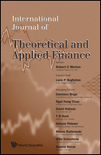
International Journal of Theoretical and Applied Finance
Pioneering insights for a complex financial landscape.International Journal of Theoretical and Applied Finance is a distinguished publication in the field of finance, serving as a critical platform for the dissemination of innovative research and theoretical insights since its inception in 2003. Published by World Scientific Publishing Co Pte Ltd in Singapore, this journal boasts an impressive Q2 ranking in the realms of Economics, Econometrics, and Finance (miscellaneous) and a solid Q3 status in Finance for 2023. With a commitment to advancing knowledge in the complex world of theoretical frameworks and applied financial practices, it welcomes original research articles, comprehensive reviews, and case studies that explore varied facets of finance. Researchers, professionals, and students benefit from the journal's rigorous peer-review process and an ever-expanding repository of knowledge, making it an indispensable resource in the financial academic community. The journal does not currently offer open access, reflecting its selective approach to publishing high-quality content aimed at a specialized audience.
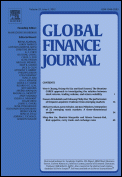
Global Finance Journal
Pioneering research for a global financial future.Global Finance Journal is an esteemed periodical published by Elsevier, dedicated to the dynamic fields of finance and economics. With an impressive history spanning from 1989 to 2024, this journal holds a significant position in the academic community, boasting a Q1 quartile ranking in both Economics and Econometrics, as well as Finance, as of 2023. It is highly regarded in Scopus rankings, placing 40th out of 317 in Finance and 99th out of 716 in Economics and Econometrics, demonstrating its influence and reach among researchers and practitioners alike. Although not an open-access journal, the Global Finance Journal provides rigorous peer-reviewed articles that explore critical issues, advance theoretical frameworks, and address practical applications in global finance. As such, it serves as a vital resource for researchers, financial professionals, and students aiming to deepen their understanding of economic phenomena and contribute to the ongoing discourse in these vibrant disciplines.

Pacific-Basin Finance Journal
Navigating Economic Dynamics in the Pacific RegionPacific-Basin Finance Journal is a prestigious academic journal that focuses on critical developments and innovative research within the fields of finance and economics, specifically tailored to the Pacific region's unique economic landscape. Published by Elsevier, the journal boasts an impressive impact factor and is categorized in the Q1 quartile for both Economics and Econometrics and Finance as of 2023. This indicates its high relevance and position among the top journals in its field, with Scopus rankings reflecting a strong standing in the competitive landscape of finance research, holding the 45th position out of 317 in Finance and the 108th in Econometrics. Established in 1993, the journal is committed to disseminating rigorous theoretical and empirical research findings that enhance the understanding of financial systems in the Pacific Basin. Although the journal is not open access, it provides invaluable insights and comprehensive studies aimed at professionals, researchers, and students alike, fostering a deeper comprehension of the region's economic dynamics and global interconnectedness.
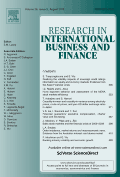
Research in International Business and Finance
Unveiling innovative theories in global finance.Research in International Business and Finance is a premier academic journal published by ELSEVIER, dedicated to advancing the field of international business and finance through high-quality research dissemination. With its ISSN 0275-5319 and E-ISSN 1878-3384, this journal stands out in the international research community, boasting an impressive Q1 ranking in both the Business, Management and Accounting and Finance categories for 2023. The journal aims to stimulate insightful discussions and provide a platform for innovative theories and practices from global perspectives, emphasizing empirical research and critical analysis. As it converges towards 2025, it continues to hold a prominent position in its fields, currently ranking #8 out of 189 in Business and #18 out of 317 in Finance according to Scopus. Although it does not offer open access options, the journal’s rigorous peer-review process ensures that only the most impactful research is published, making it an essential resource for researchers, professionals, and students striving for excellence in international business and finance.
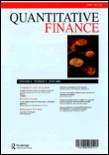
QUANTITATIVE FINANCE
Empowering research excellence in quantitative methods.QUANTITATIVE FINANCE, published by Routledge Journals, Taylor & Francis Ltd, stands at the forefront of academic research in the dynamic fields of finance, economics, and econometrics. With a strong commitment to disseminating cutting-edge research, this esteemed journal, which has been published since 2001 and continues to thrive with an anticipated convergence until 2024, occupies a prestigious Q1 ranking in Economics, Econometrics, and Finance and a Q2 ranking in Finance as of 2023. It serves as an essential platform for interdisciplinary studies, aiming to bridge theoretical approaches and practical applications in quantitative methods. Researchers, professionals, and students are provided access to a wealth of high-quality articles that contribute to the ongoing discourse and advancements in these fields. As the journal continues to impact its community, QUANTITATIVE FINANCE remains an invaluable resource for those seeking to stay at the cutting edge of financial research and its applications globally.

Journal of Investment Management
Bridging Theory and Practice in Investment Management.The Journal of Investment Management, with ISSN 1545-9144 and E-ISSN 1545-9152, is a prominent platform dedicated to the dissemination of cutting-edge research in the field of investment management. Published by JOURNAL INVESTMENT MANAGEMENT, this journal aims to bridge the gap between theoretical foundations and practical applications, catering to the needs of researchers, professionals, and students alike. With a focus on contemporary issues influencing investment strategies, asset allocation, risk management, and financial innovation, this journal provides valuable insights and methodologies to enhance investment decision-making processes. While currently not operating under an open-access model, the journal is accessible through various academic databases, ensuring that its critical findings reach a wide audience across the globe. Emphasizing the significance of empirical research and analytical rigor, the Journal of Investment Management plays a crucial role in shaping the future of investment practices and academic discourse in this dynamic field.
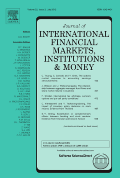
Journal of International Financial Markets Institutions & Money
Transforming Perspectives on Financial SystemsThe Journal of International Financial Markets, Institutions & Money, published by Elsevier, serves as a leading platform for the dissemination of high-quality research in the fields of finance, economics, and econometrics. With an impressive impact factor reflected in its status as a Q1 journal in both categories for 2023, it ranks among the top journals, positioned at #47 out of 317 in Finance and #111 out of 716 in Economics. This journal offers a unique focus on the interplay between financial markets and institutions on a global scale, making it an essential resource for scholars, practitioners, and students alike. The journal welcomes innovative theoretical, empirical, and applied research, contributing to an exciting dialogue that shapes the future of international finance. For researchers looking to publish their findings, this journal is committed to rigorously engaging with contemporary financial phenomena, positioning itself as a vital cornerstone of academic and professional discourse.